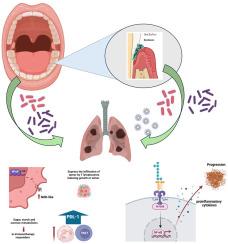Exploring the role of the oral microbiome in saliva, sputum, bronchoalveolar fluid, and lung cancer tumor tissue: A systematic review
IF 5
2区 医学
Q2 Medicine
引用次数: 0
Abstract
Objective
To explore the association between the oral microbiome and the presence or progression of lung cancer (LC) using metagenomic sequencing techniques.
Methods
Databases, including PubMed and EMBASE, were reviewed. Eligible studies included the study of oral microorganisms via genomic sequencing and molecular mechanisms associated with LC in saliva, sputum, bronchoalveolar lavage fluid (BALF), or tumor tissue from LC patients. A quality analysis of the studies was carried out, and a qualitative synthesis was performed according to the localization and sample type. Meta-analysis was performed on alpha diversity indexes.
Results
Of the 1880 scrutinized articles, 50 studies were selected, comprising 29 cross-sectional, 7 case-control, and 14 cohort studies. The quality analysis sheds light on potential biases. The findings revealed a conspicuous overgrowth of specific microbial taxa in LC patients' saliva BALF samples of Veillonella and Streptococcus. Conversely, the Bacteroides genus, related to periodontal disease, exhibited no significant correlation with LC. Microorganisms in tumoral tissue were associated with poor prognosis. Veillonella was associated with a better response to ICIs therapy. Oral microorganisms were related to metabolic reprogramming with xenobiotic biodegradation, amino acid, sugar, sucrose, and lipidic metabolism, immune modulation, and proinflammatory responses.
Conclusion
Overgrowth of specific oral microorganisms in the saliva and BALF is associated with diagnosis, poor prognosis, and low response to immunotherapy. Veillonella could be a marker for response to ICIs therapy. Further well-designed studies should evaluate the impact of the oral microbiome on the response to ICIs.

口腔微生物组在唾液、痰液、支气管肺泡液和肺癌肿瘤组织中的作用:一项系统综述
目的应用宏基因组测序技术探讨口腔微生物组与肺癌(LC)存在或进展的关系。方法对PubMed、EMBASE等数据库进行分析。符合条件的研究包括通过基因组测序和唾液、痰液、支气管肺泡灌洗液(BALF)或LC患者肿瘤组织中与LC相关的口腔微生物的分子机制研究。对研究进行质量分析,并根据定位和样品类型进行定性综合。对α多样性指数进行meta分析。结果在1880篇仔细审查的文章中,选择了50项研究,包括29项横断面研究,7项病例对照研究和14项队列研究。质量分析揭示了潜在的偏见。结果显示,LC患者唾液BALF样本中,细孔菌和链球菌的特定微生物类群明显过度生长。相反,与牙周病相关的拟杆菌属与LC无显著相关性。肿瘤组织中的微生物与预后不良有关。细孔菌与ICIs治疗的更好反应相关。口腔微生物与外源生物降解、氨基酸、糖、蔗糖和脂质代谢、免疫调节和促炎反应等代谢重编程有关。结论口腔特异性微生物在唾液和BALF中的过度生长与诊断、预后差和免疫治疗反应低有关。细孔菌可能是对ICIs治疗反应的标志。进一步精心设计的研究应评估口腔微生物组对ICIs反应的影响。
本文章由计算机程序翻译,如有差异,请以英文原文为准。
求助全文
约1分钟内获得全文
求助全文
来源期刊

Translational Oncology
ONCOLOGY-
CiteScore
8.40
自引率
2.00%
发文量
314
审稿时长
54 days
期刊介绍:
Translational Oncology publishes the results of novel research investigations which bridge the laboratory and clinical settings including risk assessment, cellular and molecular characterization, prevention, detection, diagnosis and treatment of human cancers with the overall goal of improving the clinical care of oncology patients. Translational Oncology will publish laboratory studies of novel therapeutic interventions as well as clinical trials which evaluate new treatment paradigms for cancer. Peer reviewed manuscript types include Original Reports, Reviews and Editorials.
 求助内容:
求助内容: 应助结果提醒方式:
应助结果提醒方式:


